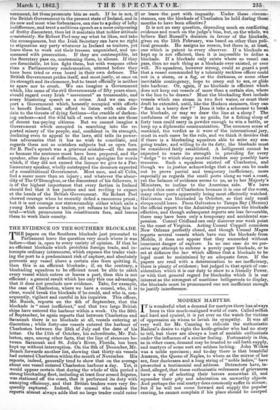THE EVIDENCE ON THE SOUTHERN BLOCKADE T " tapers on the
Southern blockade just presented to Parliament leave the question very much where it was before—that is, open to every variety of opinion. If that be an efficient blockade which prohibits foreign trade, and in- tercepts ordinary intercourse, which exposes the trader visit- ing the port to a predominant risk of capture, and absolutely prevents any vessel above a certain size from quitting it, then this is an efficient blockade ; if, on the contrary, a blockading squadron to be efficient must be able to catch every vessel which enters or leaves a port, then this is not efficient : a general result which has only this one advantage, that it does not preclude new evidence. Take, for example, the case of Charleston, where we have a consul, who, it is clear, would break the blockade if he could, and who is, con- sequently, vigilant and careful in his inquiries. This officer, Mr. Bunch, reports on the 4th of September, that the blockade is "most inefficient," and that two large British ships have entered the harbour within a week. On the 30th of September, he again reports that between Charleston and Savannah there is no blockade at all, vessels entering at discretion ; while forty-one vessels entered the harbour of Charleston between the 25th of July and the date of his letter. On the 11th of October, his subordinate, Mr. Ful- larton, says, among other facts, that the line of steamers be- tween Savannah and St. John's River, Florida, has been kept up without interruption. On the 9th of December, Mr. Bunch forwards another list, showing that thirty-six vessels had entered Charleston within the month of November. His reports, indeed, generally tend to show that on the average about one vessel entered Charleston harbour a day. Yet, it would appear certain that during the whole of this period a strong blockading fleet, including at least four armed frigates, was stationed oft the coast, that it performed its duty with annoying efficiency, and that British traders were very fre- quently captured. Indeed, the consul who makes the reports almost always adds that no large trader could enter or leave the port with impunity. *Under these circum- stances, can the blockade of Charleston be held during those months to have been effective ?
It is not an easy question depending much on conflicting evidence and much on the judge's bias, but, on the whole we believe Earl Russell's decision in favour of the blockade, given on the 15th February, was based on other than poli- tical grounds. He assigns no reason, but there is, at least, one which is patent to every observer. If 'a blockade so' kept up is not efficient, then it is impossible to define a blockade. If a blockade only exists where no vessel can pass, then no such thing as a blockade ever existed, or ever will. No squadron, however strong, could so guard a port that a vessel commanded by a tolerably reckless officer could not in a storm, or a fog, or the darkness, or some other inevitable contingency, hope to creep out to sea, or glide into harbour. Or, again, if no blockade is efficient which does not keep out vessels of more than a certain size, where. is the line to be drawn? Must the blockading fleet include vessels which can steam in two feet water, or must their draft be extended, until, like the Hudson steamers, they can "float in a heavy dew ?" Does it take a schooner to break the blockade, or may we draw the line at a sloop ? The usefulness of the cargo is no guide, for a fishing sloop of forty tons could carry in powder enough to win a battle, or keep up a diplomatic communication. The common sense of mankind, the verdict as it were of the international jury, must in such cases be the rule, and we think it decides that if there is a blockading squadron able to seize any sea- going trader, and willing to do its duty, the blockade must be considered fairly established. A belligerent cannot be expected to waste its strength in providing for every. " dodge " to which sharp neutral traders may possibly have recourse. Such a squadron existed off Charleston, and though we in justice acknowledge that a case can be made out to prove partial and temporary inefficiency, more especially as regards the small ports along so vast a coast, yet the balance of evidence seems to us, as to her Majesty's Ministers, to incline to the American aide. We have quoted this case of Charleston because it is one of the worst, many other ports apparently being most efficiently watched. Galveston was blockaded in October, so that only small sloops could leave. From Galveston to Tampa Bay (Mexico) the official report to the Admiralty pronounces the blockade effective, and though subsequent reports are less favourable, there may have been only a temporary and accidental sue- pension. Consul Cridland can only discover one weak point on the coast of Virginia. Acting Consul Coppell considers New Orleans perfectly closed, and though Consul Magee reports several vessels which have run the blockade from Mobile, it does not appear that they succeeded without imminent danger of capture. In no one case do we per- ceive any attempt to enforce a purely paper blockade, or to set at defiance the law which affirms that a blockade to be legal must be maintained by an adequate force. If the papers are read with a determination to see inefficiency-, there is plenty of evidence ; but judged in that spirit of con- sideration which it is our duty to show to a friendly Power, or with that general regard for blockades which it is our interest as the strongest of maritime belligerents to display, the blockade must be pronounced one not inefficient enough to justify interference.






























 Previous page
Previous page